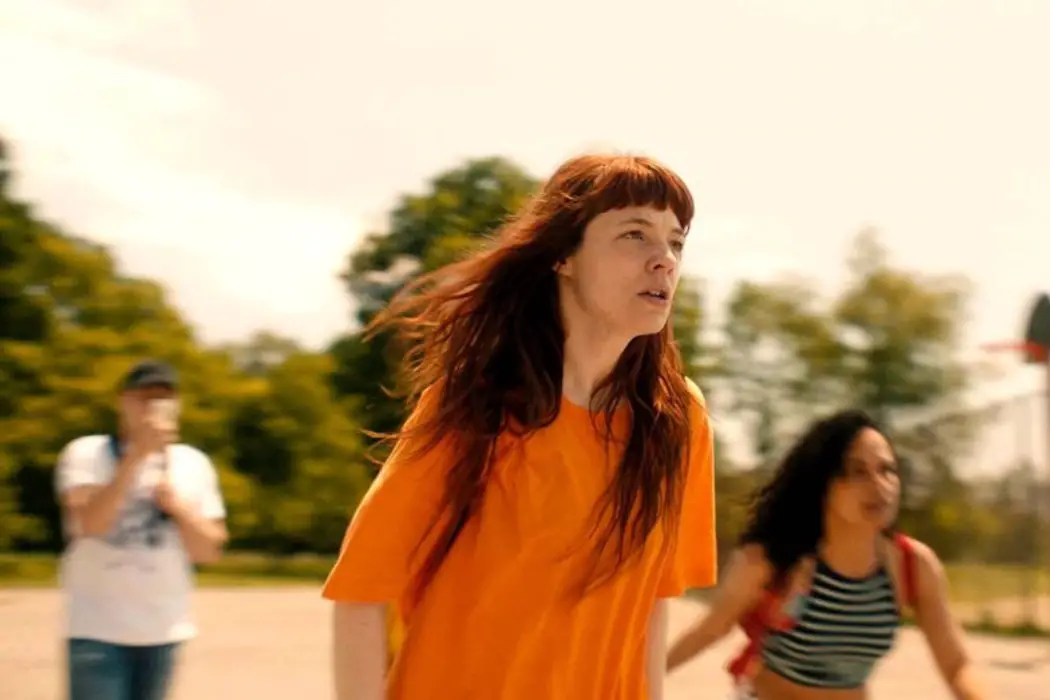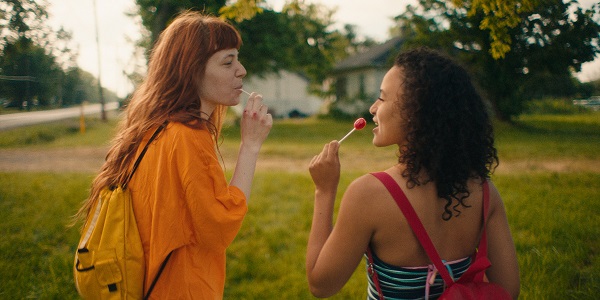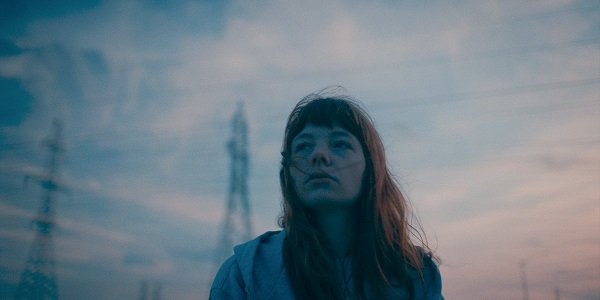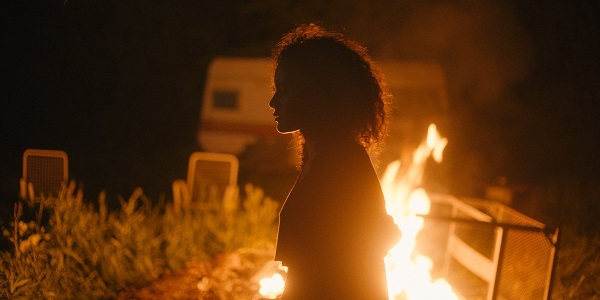FIRECRACKERS: A Dynamite Debut Feature

Lee Jutton has directed short films starring a killer toaster,…
Winner of Best Director for writer-director Jasmin Mozaffari at this year’s Canadian Screen Awards, Firecrackers is the story of two rebellious teens from a small town in Canada whose plans to run away go awry after one of them is assaulted. Photographed in an almost magical-realist style despite being a story firmly grounded on this earth, it is a remarkably assured debut feature that highlights the humanity in the girls who society prefers to ignore – girls who don’t conform and are loud and proud about doing so.
Girlhood in the Gutter
Lou (Michaela Kurimsky) and Chantal (Karena Evans) are best friends in a small town in Canada who dream of running away to New York together. Lou is a rebel with a personality as fiery as her wild mane of red hair; when we first meet her onscreen, she is beating another teenage girl to a pulp while Chantal and other onlookers cheer her on. At home, she constantly butts heads with her mother (Tamara LeClair), a recovering addict who has recently found Jesus as well as a much younger boyfriend (David Kingston) who is also attempting to put his troubled past in the rearview mirror, with mixed results.
Despite Lou’s obvious affection for her younger brother (Callum Thompson), who has a penchant for stealing her makeup, it’s clear that she can’t remain under the same, suffocatingly small roof as her judgmental mother for much longer. Meanwhile, Chantal is tired of dealing with the invasive questions and prejudices that come with being one of the only nonwhite girls in an isolated small town – not to mention her possessive ex-boyfriend, Kyle (Dylan Mask), who won’t stop texting her post-breakup.

Lou and Chantal are breathtakingly close to making their dreams of escape a reality; they have saved up their wages from their jobs cleaning rooms at a local motel, and their friend Josh (Scott Cleland) has a brand new truck and a willingness to run away with them. However, during a celebratory night of partying, Kyle shows up and assaults Chantal in a fit of jealous rage. The repercussions of this crime shake up the girls’ plans to an extreme degree. A drunken bender leads to an act of revenge by Lou that results in the loss of their transportation and their money. As Chantal spirals out of control in an attempt to submerge her trauma, Lou attempts to scrounge up new means of escape by any means necessary – but both girls’ desperate actions threaten to derail their friendship as well as their futures.
Born to Run
Mozaffari has centered her debut feature – an expansion of an earlier short film of hers – on the coming-of-age of two girls who, through no fault of their own, began life a step behind everyone else, and seem doomed to never catch up. Lou and Chantal don’t have supportive parents or nice houses in which they can seek solace in times of unhappiness – they only have each other. Absent the natural-born privilege of the leads in Booksmart and even Lady Bird, the girls of Firecrackers aren’t trying to get into fancy colleges or accomplish great deeds; they’re just trying to stay alive and in control of their own futures in a world where they are destined to be used and abused by those around them. And they have no qualms about pissing people in order to do so.

Following Chantal’s assault and Lou’s outburst of rage on her behalf, almost every other character in the film lectures Lou about the consequences of her actions, as though she were the villain and Kyle the victim. Even Chantal questions what Lou hoped to accomplish by acting out, arguing that guys like Kyle are never punished for their crimes and it’s foolish to ever expect them to be. In their repressive community, the notion of women needing to watch themselves and remain vigilant lest men punish them for their actions has been ingrained in them since their birth, and by refusing to accept this reality, Lou is the odd one out. This is just one source of the film’s incredible power, for one only has to look at the modern media narratives around assault and its aftermath to understand that the world Mozaffari depicts in Firecrackers is all too real for so many women in the world.
Mozaffari presents the gritty reality of Lou and Chantal’s lives without flinching but also without exploitation. The assault is not portrayed onscreen or described in detail; it’s only through Chantal’s shellshocked reaction the next morning that we understand the gravity of what she has been through, and it is no less impactful an event for that. Mozaffari respects her characters even if no one else around them does, telling their troubled story with a deep sense of empathy and understanding that filters down to the audience and guarantees our sympathy even in their most misguided hours. Indeed, Firecrackers is unapologetic when it comes to the lengths Lou and Chantal will go to gain their freedom, which I found quite refreshing; too often the so-called bad girls – the girls who fight and scrap and party with abandon, as though it could all end tomorrow – are forced to redeem themselves by becoming something they are not, as though only the pure at heart are worthy of happiness.

Many ugly and unfortunate things happen in Firecrackers, yet the film is incredibly beautiful to look at throughout. Despite the utterly ordinary town that the film takes place in, it is shot in such an awe-inspiring way that even the most mundane landscapes seem to have inherent magic. The film doesn’t shy away from using close-ups, in which cinematographer Catherine Lutes masterfully uses natural light and shadow to highlight the actors’ faces and accentuate the rawness of their performances. With her vibrant red hair and outrageously oversized clothing – a Botticelli beauty from the wrong side of the tracks – Kurimsky’s portrayal of Lou is positively electric, while Evans’ emotionally intelligent work ensures that Chantal is always so much more than a victim who suffers in order to move the story along.
Firecrackers: Conclusion
From the first frame to the last, Firecrackers is clearly a story by women, about women, stubbornly through their gaze without regrets. For a first feature, it is an incredible accomplishment and one that deserves to be seen widely despite its very limited release. I saw it in the only theater that was showing it in New York, with an audience of only four others. If you have the opportunity to see it on a big screen, don’t let it slip by.
What do you think? Does Firecrackers pique your interest? Share your thoughts in the comments below.
Watch Firecrackers
Does content like this matter to you?
Become a Member and support film journalism. Unlock access to all of Film Inquiry`s great articles. Join a community of like-minded readers who are passionate about cinema - get access to our private members Network, give back to independent filmmakers, and more.
Lee Jutton has directed short films starring a killer toaster, a killer Christmas tree, and a not-killer leopard. Her writing has appeared in publications such as Film School Rejects, Bitch: A Feminist Response to Pop Culture, Bitch Flicks, TV Fanatic, and Just Press Play. When not watching, making, or writing about films, she can usually be found on Twitter obsessing over soccer, BTS, and her cat.













